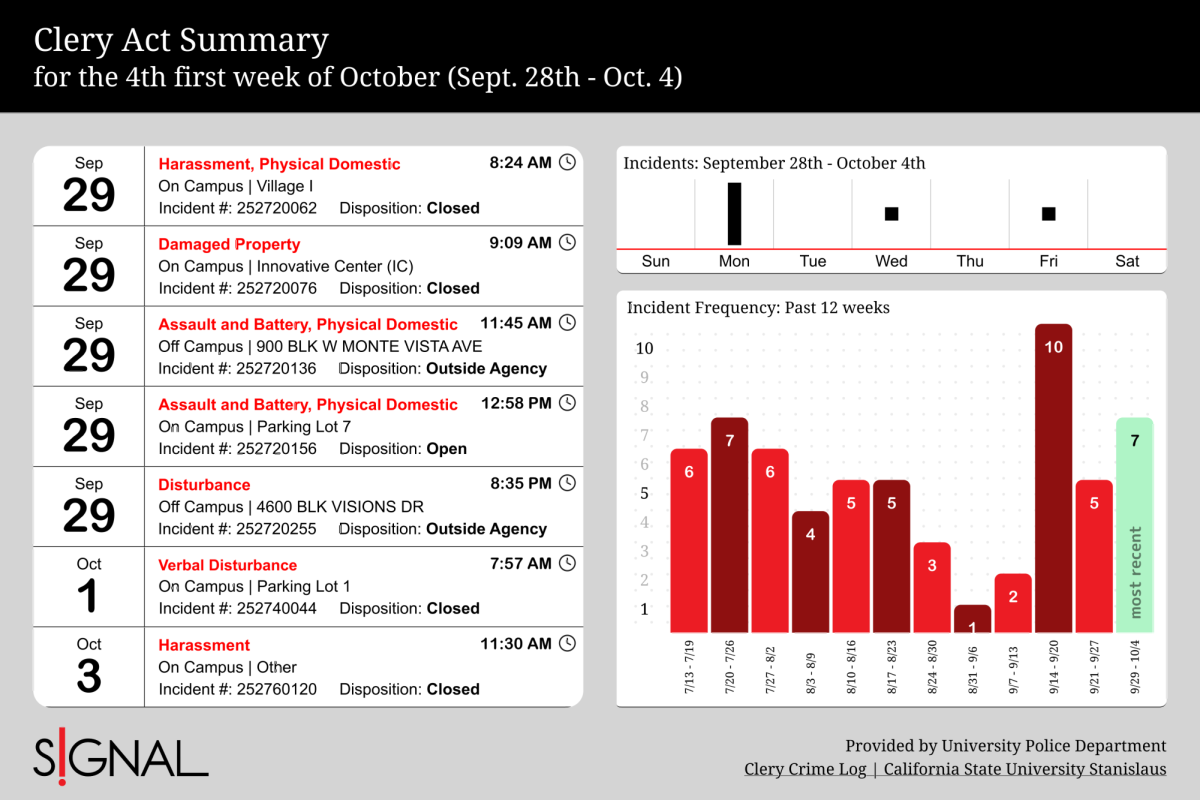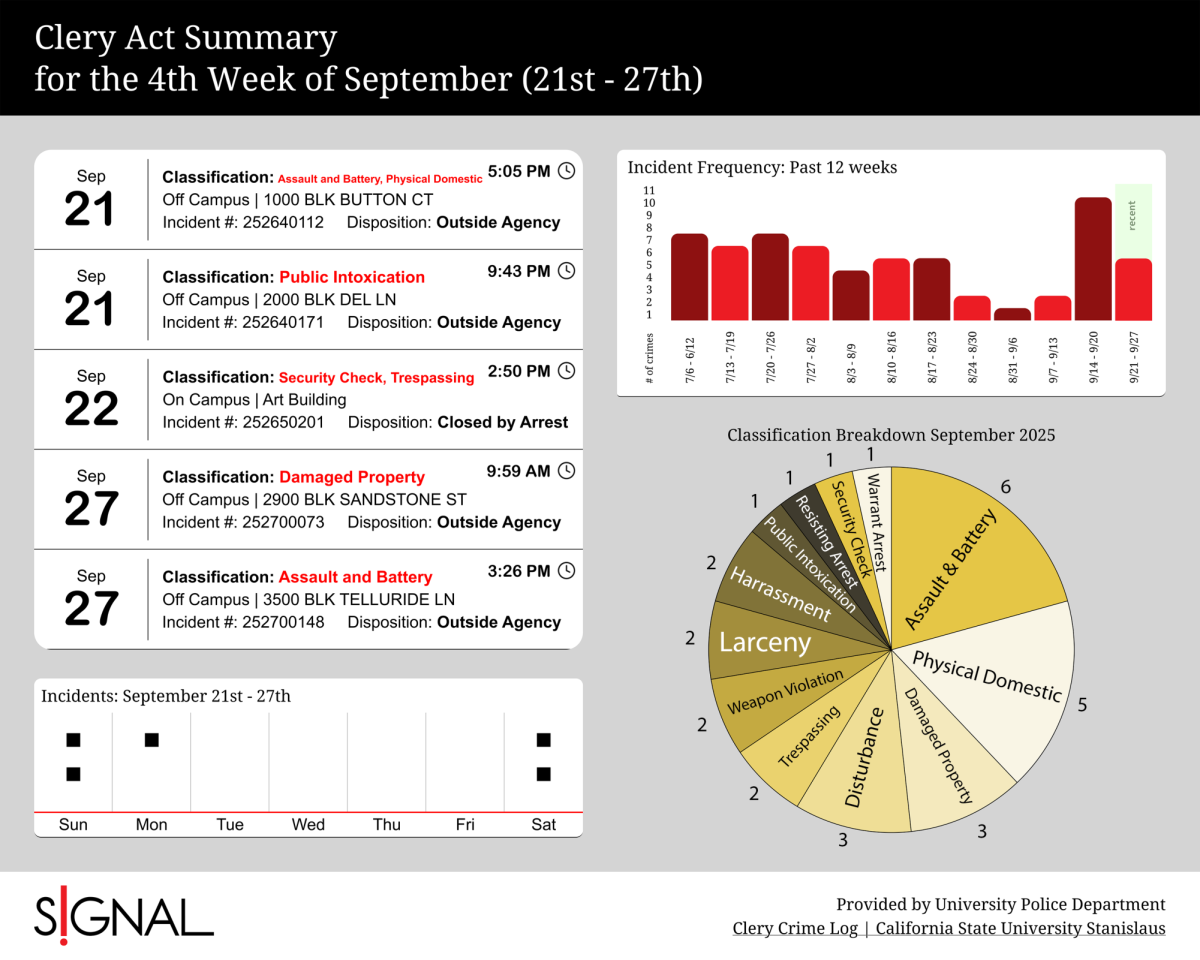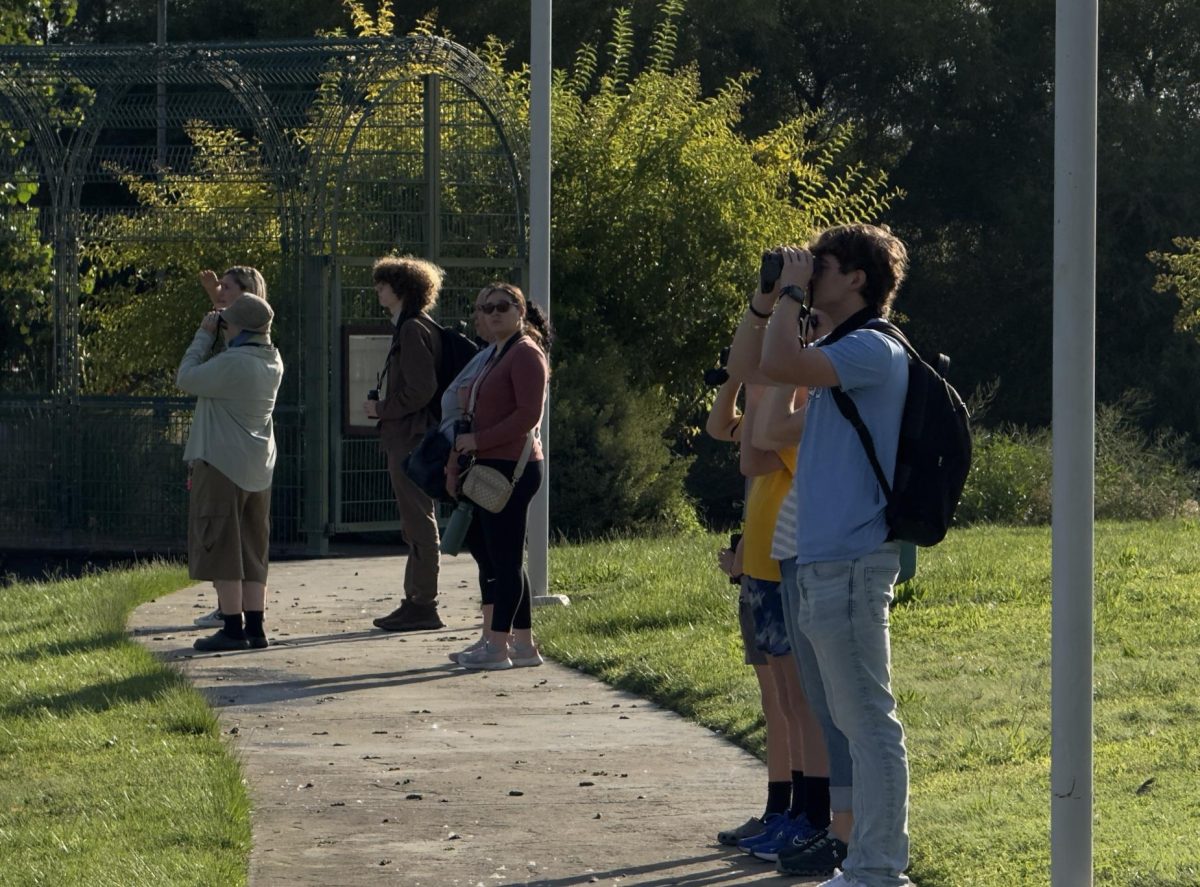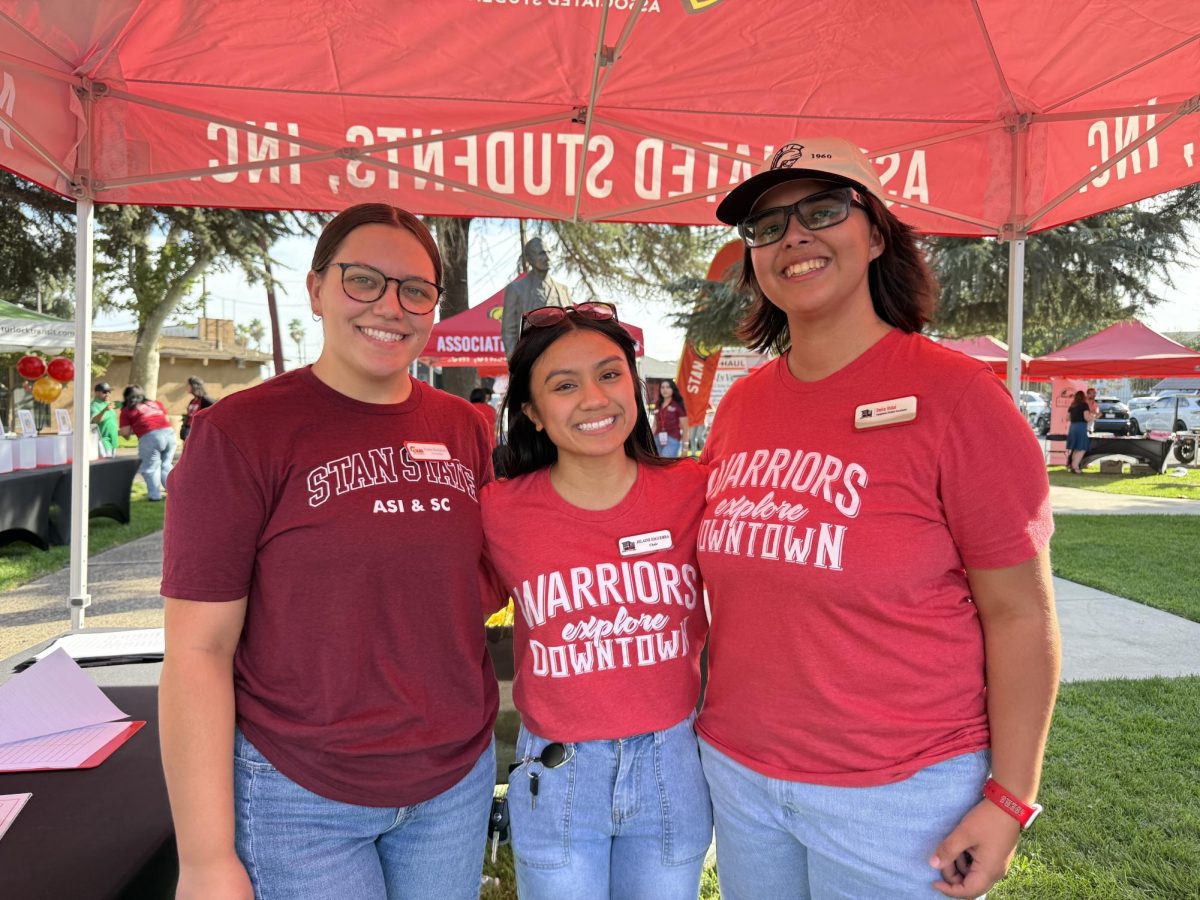On Wednesday, March 24, Stan State’s College of Business Administration held its 11th Annual Women’s Leadership Forum. Female entrepreneurs located in the Central Valley gathered to discuss their experiences as business leaders and to provide advice and resources to aspiring entrepreneurs.
Each of the event’s speakers agreed they started their respective businesses because they noticed a need around them and realized they had the vision and the capacity to fill that need.
Jamie Norwood is co-founder and president of Amalia’s Cocina, Inc., a company that provides cooking sauces made in the Central Valley based on her grandmother, Amalia Portillo’s, recipes. These sauces are available in stores across the United States and in Canada.
Norwood described the inspiration for launching this business. “I wanted to cook like my mother,” Norwood stated. “What I could get at the grocery store was subpar.”
Wanting to provide her community with authentic, delicious sauces made from high-quality ingredients, Norwood said she “bootstrapped” her business. She searched for small-scale packaging companies and began selling the sauces at farmers markets. At the same time, she entered multiple local entrepreneurship competitions to make connections and learn more about the food industry.
Norwood asserted that by being aggressive, taking new opportunities, and believing in your product and its value to customers, you can also launch a successful business.
Maria Mendoza, co-owner of Newman Freight, a transportation brokerage company, explained how her proximity to the trucking industry allowed her to realize where the industry needed to better support its drivers.
Mendoza stated that she saw brokerage firms take advantage of truck drivers in order to turn a higher profit. Experiencing injustice in the brokerage side of the transportation industry inspired her to establish a company that put drivers first and provided them with quality services at a reasonable price.
When starting Newman Freight, Mendoza told herself, “I’m going to do it for the people like my dad, like my uncles.”
Teresa Esquivez, a co-owner of Newman Freight, was also raised by family members who were in the trucking industry. As with Mendoza, Esquivez witnessed the difficulties truck drivers face and their need for additional support. Her drive to create a business to provide this support was inspired by watching her father begin his own business.
“I saw leadership in my dad, and it kept me going,” Mendoza said.
For other speakers, their environments also influenced their passion in business and the needs they noticed in their communities.
Ali Cox, CEO of AC&C Marketing, grew up in the Central Valley. As a fifth generation farmer, she is deeply connected to the region’s agriculture industry. Cox’s company, AC&C Marketing, strives to help businesses improve their marketing strategies and digital content. This also means helping depict the Valley’s agricultural stories.
Cox claimed she built her business because she believed she had the ability to make change in the realm of marketing. “I did it because I felt like I had a really unique point of view,” Cox said.
Additionally, Cox was motivated by perhaps the most enticing aspect of being an entrepreneur, getting to be your own boss.
“I wanted a lot of freedom,” Cox said. In addition to working in a field you are passionate about and serving others, Cox maintained that one of the desirable consequences of starting a business is that “you’re crafting your own destiny.”
Yet, she and the rest of the speakers also held that becoming an entrepreneur, specifically a female entrepreneur, requires a great deal of work in any field.
Andreanna Marshall is a Stan State alum and president of Project Academy, an organization that trains current and aspiring project managers. Concurrently, Marshall works full-time as a senior program manager at Amazon.
During the forum, Marshall explained that she was not the biggest advocate for multitasking. In managing a full-time job on top of running a business and actively spending time with family and friends, she finds it more effective to block out her time, dedicating each block to one job or task.
“I am pretty strict on my schedule,” Marshall said. “I’m very calendar-oriented.” Which, she argued, works about 70% to 80% of the time. As a business leader, “you’re constantly developing.”
With the demanding nature of launching a business from scratch, it’s important to know where to find resources to support you. Mendoza emphasized the importance of sitting down with family and friends to discuss your goals as a business owner and to ask for help.
“In my culture, I was expected to stay at home,” Mendoza said. Balancing the demands of being a wife and mother with the responsibilities of being a business owner was not easy, especially in the beginning.
Mendoza discussed how she explained her aspirations for the business with her family members and together, they arranged schedules to ensure that her children received care and quality time with all of them and that her business thrived.
Esquivez described how, during her undergraduate years at Stan State, she accessed multiple resources offered by the university which allowed her to network with professionals and become familiar with business practices. After graduating, she also utilized the program Opportunity Stanislaus in Modesto, California.
Norwood encouraged all potential business owners to participate in local entrepreneurship competitions. Competitions such as Angel Investors, Pitch Your Business, and the Valley Apprentice were extremely valuable to Norwood as she made important connections and even found job opportunities. She found the information for these competitions primarily through newspapers such as the Modesto Bee and the Turlock Journal.
According to Norwood, “It takes a long time to know the industry.” It is important to remain active in local events and learn through experience. “You never know where they [entrepreneurship competitions] are going to lead,” Norwood asserted.
The speakers also discussed two other vital resources for current and aspiring entrepreneurs: yourself and other business leaders.
Esquivez stressed the importance of self-development. She urged attendees to read, read, read and read some more. Becoming well-versed in leadership skills and in the industry you are trying to enter will minimize obstacles and promote success.
“Our limiting beliefs have to stop at a certain point,” Esquivez argued. There is always more information to be gained and new opportunities to take advantage of. Overcoming self-doubt and increasing knowledge can help females in particular enter and thrive in typically male-dominated industries.
Marshall, who has spent her entire career journey in the tech industry, is familiar with being the only female in a workplace full of men. Already passionate about mentoring others, Marshall found that she could use her own expertise to support other women.
Event moderator Karlha Davis explained how this mentorship of others can seem intimidating, even detrimental to one’s own success. In business, especially when starting young, “There’s insecurities and a lack of confidence,” Davis said.
Due to the competitive nature of business, it may strike some as counterintuitive to share their own expertise. This might be especially true for women entering a male-dominated field.
However, all of the forum’s speakers agree that it is imperative for your own success and for the benefit of your consumers and clients to impart and receive knowledge from other female business leaders.
Norwood claimed, “One thing I love about being a woman… I feel like we have a special way of connecting. We bring something more unique to the table as far as communication.” This ability, according to Norwood, allows women to be authentic and invaluable business leaders and entrepreneurs.
“We all want to support our families, and we all want to succeed,” Norwood concluded. The best way to do that is to share your own wealth of knowledge and to seek help from others.
Cox stated, “You can have it all, but you can’t have it all everyday.” While owning and operating a business, sacrifices have to be made and that’s okay. Relying on one’s team is a necessary part of being a successful entrepreneur.
The forum closed with discussions concerning the pandemic’s effect on business leaders and advice for those hesitant to launch their own business ideas during this time.
“Crisis breeds innovation,” Cox said. In 2009, while the U.S. was in the midst of a recession, Cox faced many challenges as a business owner. However, she maintained it was that season of hardship that prepared her for the challenges brought about by the COVID-19 pandemic.
It was during the recession that new business ideas, which would be successful and powerful in the future, were formulated and eventually founded.
“What will come in the next five years is brewing now,” Cox said. For those unsure whether or not to begin sending their business plans into action, Cox contended, “Now is for sure the right time.”
Stan State’s Annual Women’s Leadership Forum was founded by former dean of the College of Business Administration, Dr. Linda Nowak and is held every March. It is now led by current dean Dr. Tomas Gomez-Arias.
Each of the speaker’s for this year’s forum can be found on LinkedIn, and Teresa Esquivez provided her Instagram page @teresa_meansbusiness.
Categories:
11th Women’s Leadership Forum Hosts the Valley’s Female Entrepreneurs
Maya Radcliffe
•
March 25, 2021
Image provided through the Event Details page.
0
More to Discover











